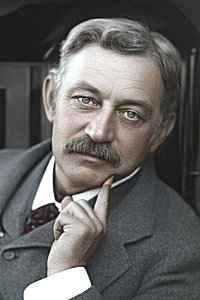Introduction
Born: 1847, Montego Bay, Jamaica.
Died: February 16, 1928, London, England.

December 1, 1908
Born: 1847, Montego Bay, Jamaica.
Died: February 16, 1928, London, England.

Boyd studied under Sabine Baring-Gould, then attended Worcester College, Oxford.
Ordained an Anglican priest in 1877, he eventually became vicar at All Saints Church in Norfolk Square, London (1893–1918).
An article about the origin of Boyd’s tune Pentecost appeared in The Musical Times, volume 49, number 790, December 1, 1908, pages 786–88:
The Rev. William Boyd, who comes from an old Scots stock of lowland border thieves—as he wont to say—and is now Vicar of All Saints’, Norfolk Square, Hyde Park, has been kind enough, in a pleasant conversation with the present writer to tell the story of his popular tune.
‘I began to compose,’ he says, ‘when I was a boy of ten years of age. Some of my youthful attempts you will find in “Iceland, its scenes and sagas” (1863), by Baring-Gould. He was my tutor at Hurstpierpoint, and during his stay in Iceland (in 1862) he wrote to me often, exemplifying his letters by characteristic pen-and-ink sketches to describe men and things.
‘For that, his first book, I put into harmonized shape some of the tunes he had noted down during his Icelandic tour. I went up to Oxford in 1864, and was organ scholar of my college (Worcester), and I also played at St. Edmund Hall, Trinity and Pembroke.’ Here it should be stated that the Rev. Baring-Gould’s first curacy was at Horbury, near Wakefield, a place which gave the name to Dykes’ setting of ‘Nearer my God, to Thee.’
To continue Mr. Boyd’s narrative. ‘Baring-Gould asked me to compose a tune to “Come, Holy Ghost, our souls inspire,” to be sung at a large meeting of Yorkshire colliers at Whitsuntide which he had organized. I walked, talked, slept and ate with the words, and at last I evolved the tune which I naturally named “Pentecost,” which had an enormous vogue in Yorkshire.
‘One day, during my undergraduate period at Oxford, G. A. Beecroft, a Christ Church man and an amateur musician, came to me and said: “I want some fellows who write hymn-tunes above the average to contribute to a book I am getting up—write me three.” I agreed, and sent him four tunes, from Clent, in Worcestershire, where I was spending Christmas with my friend, John Amphlett—now a well known literary figure in the country. One of the tunes was “Pentecost,” which I had previously composed for Baring-Gould, but which remained in manuscript. Beecroft’s collection was published by Bowden, of Oxford, in the sixties…
‘How came the tune to be associated with “Fight the good fight”’? we ask Mr. Boyd. ‘Ah! that is a funny thing,’ he replies. ‘One day, as I was walking along Regent Street, I felt a slap on my back, and turning round I saw my dear old friend Arthur Sullivan. “My dear Billy,” he said, “I’ve seen a tune of yours which I must have.” (He was then editing Church Hymns.) “All right,” I said. “Send me a cheque and I agree.” No copy of the book, much less a proof, was sent to me, and when I saw the tune I was horrified to find that Sullivan had assigned it to “Fight the good fight.” We had a regular fisticuffs about it, but judging from the favour with which the tune has been received, I feel that Sullivan was right in so mating words and music.‘
‘The tune was printed in the 1875 edition of Hymns Ancient and Modern without my permission. In their last edition they turned me out, also without my permission. Still they had to come back, I rejoice to say, for people said ‘the old was better.’ Since then it has found its way into most collections, Church of England and Nonconformist, and has gone all over the English-speaking world. There is hardly a week that I do not get a couple of letters, from far or near, asking me to allow of its insertion in some new publication. And I do, in most cases, allow it, but with the proviso that the tune must be set to the words “Fight the good fight.”’
To give you an instance of its far-reaching sweep, let me mention a reminiscence. On landing at Jamaica in January, 1902, I was approaching the great church at Kingston—now a desolation, since the earthquake—bellowed, I had almost said—by a congregation of 2,000, mostly black people. The effect was deafening.
And at the C.I.V.’s great service at St. Paul’s Cathedral, on the eve of their departure for the Boer War, it rolled through the vast building with thrilling effect, Creighton, then Bishop of London, being “greatly moved,” so he told me afterwards.’
We should here add that the King and the Prince of Wales always ask for the hymn and tune whenever the function admits of it. It is sung at all Royal confirmations—as indeed at most other confirmations. It is the favourite of both soldiers and sailors, and schoolboys and undergraduates, and scarce a service took place in South Africa that the tune was not wafted from ten thousand throats, singing on the veldt to God Almighty as the God of Battles. ‘It is the most moving hymn I know,’ said Lord Kitchener to Mr. Boyd, when he came to All Saints’ as ‘best man’ at his brother’s—Arthur Kitchener’s—wedding.’
If you know Boyd’s place of burial,